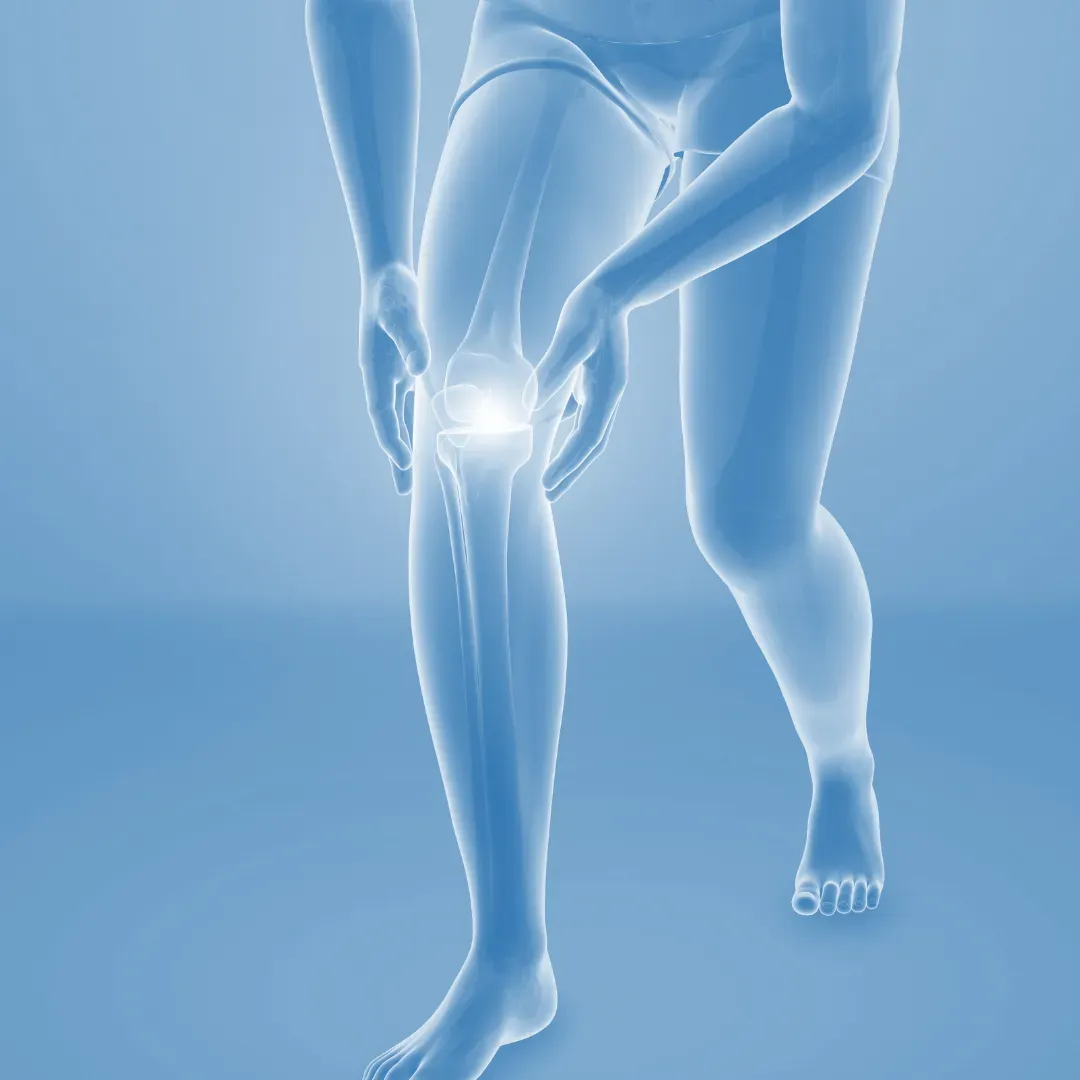
Reduce Knee Pain and Improve Your Movement
Knee pain can make simple activities like walking or climbing stairs challenging. This pain is often caused by sudden impacts, overuse, or degenerative conditions such as osteoarthritis. Common issues include ligament tears, meniscal injuries, and tendinitis.

Anatomy of theKnee
Anatomical areas in the knee that are most often injured:
- Anterior Cruciate Ligament (ACL): A key ligament for knee stability, often torn during sudden stops or changes in direction.
- Posterior Cruciate Ligament (PCL): Provides stability to the knee, can be injured from direct impact to the front of the knee.
- Medial Collateral Ligament (MCL): Stabilizes the inner knee, frequently sprained from direct blows to the outer knee.
- Lateral Collateral Ligament (LCL): Stabilizes the outer knee, can be injured from direct blows to the inner knee.
- Menisci (Medial and Lateral): Cartilage pads that cushion the knee, often torn during twisting movements.
- Patellar Tendon: Connects the kneecap to the shinbone, prone to tendinitis from repetitive jumping or running.
- Quadriceps Tendon: Connects the quadriceps muscles to the kneecap, can be strained or torn from overuse.
Common Causes of KneePain
Knee injuries are frequently caused by sudden impacts, such as falls or collisions, which can result in ligament tears or fractures; overuse, leading to conditions like tendinitis or bursitis; and repetitive motions, common in athletes, causing meniscal tears.
Other frequent triggers include poor biomechanics, leading to muscle strain and joint misalignment, and degenerative conditions like osteoarthritis. Underlying medical conditions such as rheumatoid arthritis can also contribute to knee injuries.

Chiropractic care can help alleviate knee pain caused by injuries, overuse, or degenerative conditions like osteoarthritis. Chiropractors perform adjustments to the knee joint and surrounding areas to improve alignment and reduce pressure on the nerves
Chiropractic care can provide long-term relief and improve overall knee function by addressing the root cause of the injury. It's a good option to consider if you prefer a non-invasive approach to managing your pain.


If you are experiencing persistent knee pain that does not get better with rest or medication, think about trying physiotherapy. This treatment can be especially beneficial for individuals with issues such as meniscal tears or ligament injuries.
Physiotherapy provides a gentle approach to alleviating pain and enhancing knee function, potentially allowing you to steer clear of more intense interventions like injections or surgery.
If you are experiencing persistent knee pain that does not get better with rest or medication, think about trying massage therapy. This treatment can be especially beneficial for individuals with issues such as meniscal tears or ligament injuries.
Massage therapy provides a gentle approach, offering joint mobilizations and strengthening exercises to alleviate pain and to enhance knee function.


A Naturopathic Doctor could utilize anti-inflammatory herbs and supplements that support joint health to address knee pain resulting from injuries or degenerative conditions. They might also suggest targeted exercises to bolster the muscles surrounding the knee and enhance joint stability.
This strategy is designed to alleviate pain, improve knee function, and facilitate lasting recovery.
Call us for a no-cost, zero-obligation phone consultation.
Client Testimonials
Here’s what people are saying after receiving treatment from Anchor Health & Performance.
EMAIL: info@anchorhp.com
PHONE: (905) 625-8733
ADDRESS: 5770 Timberlea Blvd, Unit 107, Mississauga, ON
PARKING INSTRUCTIONS:
Parking is located to the front, side and back of the building. Please enter through the side doors. Once you enter the business complex, turn right. We are the last unit facing Tomken.OFFICE HOURS:
Tuesday: 8:00am - 7:00pm
Wednesday: 10:00am - 7:00pm
Thursday: 10:00am - 7:00pm
Friday: 8:00am - 4:00pm
Saturday: 8:00am - 1:00pm
Sunday - Monday: closed
